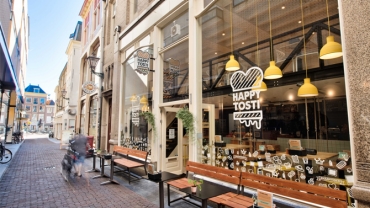
"Vulnerability leads to new insights"
Marry de Gaay Fortman, Supervisory Board member in a time of crisis
As a lawyer with Houthoff, Marry de Gaay Fortman is involved in public-private regulatory matters and specialises in public economic law and corporate governance. She combines her legal work with Supervisory Board memberships, among others at the Dutch Central Bank (DNB), KLM, and Internationaal Theater Amsterdam. She has outspoken opinions about her role as a Supervisory Board member during and after this time of crisis. “By adopting a vulnerable attitude towards one another, Executive Boards and Supervisory Boards have realised that one plus one makes three. That’s the strength that comes from vulnerability. As an Executive Board you don’t know everything and as a Supervisory Board you don’t have a monopoly on wisdom either. Brainstorming together about issues leads to new insights.”

Make both supervision and advice more intensive
Marry de Gaay Fortman states firmly that the corona crisis is making the work of Supervisory Board members really tough. “The crisis is a huge challenge, and it’s sometimes hard to shoulder responsibility, given so many uncertainties. But standing up for something, taking responsibility, and making a contribution as a Supervisory Board member – even if it’s often not visible to the world outside – is extremely satisfying when you know that you can provide great support for all parts of an organisation. Our normal supervision already has a certain dynamic involving meetings and sounding boards, but the annual agenda that we use for this has changed considerably due to the coronavirus. As members of the Supervisory Board, we’ve immediately intensified our supervision. We are consulting far more with the Executive Board and are also meeting more often as separate committees. We are now looking much closer at companies’ information, but without interfering with the decisive action and operational approach of the Executive Board. As members of the Supervisory Board, we take a close look at the consequences the crisis will have for the company, both internally – for the actual business with which the company earns money and the way it treats its employees – and externally: what are the consequences of what’s happening in the outside world and how that affects the company. We are facing a very complex crisis, including because there are so many uncertainties. As Supervisory Board members you mustn’t only intensify your supervision but also your advisory role.”
Without state support, there’ll be no KLM
An Executive Board often takes the lead as regards how the Supervisory Board is kept informed. However, the information can come from many more parts of the company. “During the corona crisis”, says De Gaay Fortman, “we Supervisory Board members also have very close and valuable contact with works councils and management teams. And it goes without saying that we also monitor social trends and assess their relevance to the companies. It would be strange, of course, if I didn’t read the newspapers and weren’t open to the feelings about how people think and talk about KLM, for example, and about the support it receives. I keep up on this from different angles, so that I know what’s feasible, desirable, and necessary. In the case of KLM it was crystal-clear: without state support KLM wouldn’t survive. From one moment to the next it became barely possible to fly, and operations went from almost one hundred percent down to ten percent. Since then, its gone back up to thirty percent and the airline is flying to more European destinations again.”
Hybrid types of festivals and theatre
At Internationaal Theater Amsterdam, where Marry de Gaay Fortman is chair of the Supervisory Board, productions also came to a standstill from one moment to the next – and that was also right in the middle of the high season. “The cash position then demands immediate attention, because costs have already been incurred, there are ongoing costs, and all the plans for the future have become uncertain because they totally depend on how the government says you can operate. Fortunately, we had a premiere again on June 1st, a solo performance by Hans Kesting. But you’re talking about an audience of only thirty people in an auditorium that’s normally filled with six hundred. That will remain a challenge in the coming period, and I foresee the same as chair of IDFA, the international documentary and film festival in Amsterdam. IDFA isn’t until November, and at first you think ‘oh well, it’ll sort itself out’. But it’s now clear that it’ll need to be a hybrid kind of festival. At the moment, you don’t know if and how you can physically admit people, so there will at least be an extensive digital programme. That’s in fact a rather positive side of the crisis, because you see that organisations are very resilient and are clearly being creative about how they can survive and continue their work – about how they can still manage to reach their audience and show that what they do is really relevant.”

"All together... That will remain a challenge in the coming period. At the moment, you don’t know if and how you can physically admit people, so there will at least be an extensive digital programme.”
Digitalisation at the Dutch Central Bank
At the Dutch Central Bank (DNB), where De Gaay Fortman is also a member of the Supervisory Board, the impact of the crisis on the organisation is entirely different. She clarifies: “At the DNB it’s not a financial but an economic crisis. Because of the applicable regulations and the role that the DNB has in relaxing certain conditions, banks can perform their work by providing more guarantees and loans. The same applies to how the pensions and the non-life and life insurance sectors can hold their own during the corona crisis and also contribute to solving the economic crisis. Nevertheless, the DNB found itself facing another challenge: because everybody switched to working from home, that had to be organised digitally in a highly effective manner. That’s been quite a job, but fortunately it’s going well.”
Leadership in a time of crisis
An important factor in guiding companies through a crisis is leadership. And in the view of Marry De Gaay Fortman, that leadership in a time of crisis can best be compared to running a military operation. “An Executive Board needs to take bold decisions right away – decisions you will have to accept as a Supervisory Board member, even though there will always be points at which you can adjust things. You can ensure that there’s time for critical review by looking closely at what the Supervisory Board can do as a whole. One member looks more at the financial side while another has a broader overview. That’s a role that’s often taken on by the chair of the Supervisory Board. He or she then stays abreast of how the company, the Executive Board, and the employees are all doing, as well as the environment and the Supervisory Board itself. What matters are we dealing with? How are we holding meetings? What are we focusing on? Do we perhaps need to bring in external experts? If the latter is really necessary and provides added value that you can’t get from within your own organisation at the moment – including because that organisation is having to focus on crisis management – then it’s a wise choice, certainly if it helps the company to get back on its own two feet.”

"The enormous creativity that’s emerging to take further steps in the field of digitalisation and sustainability is an opportunity.”
More active involvement in strategic decisions
De Gaay Fortman acknowledges that once a company has survived the worst of the crisis and the question of “what now?” arises, there’s again an important role for the Supervisory Board. “When it comes to thinking about scenarios that can be applied and about possible reorganisations and issues such as sustainability and the strategic choices that need to be made, then it goes without saying that Supervisory Board members are much more closely involved. Where strategic decisions are concerned, you definitely need to be more actively involved. Precisely because so much is still uncertain, it’s wise for the Executive Board to make good use of the knowledge and skills of the Supervisory Board members. In times of crisis, Executive Boards are in any case more open to doing that. When a company isn’t in a crisis situation, you’re usually presented with a plan that’s already been discussed in quite a few parts of the organisation. But now the Supervisory Board is actually far more ‘right there at the drawing board’. You take part in brainstorming sessions and you act much more closely with the Executive Board. That’s really interesting, but when it comes to actual implementation you adopt the natural distance again that belongs to the role of a Supervisory Board member.”
Resilience, flexibility, vulnerability
The increased involvement between the Executive Board and the Supervisory Board results from this interesting and difficult time of crisis, full of great dynamism. It demands a lot of everybody’s resilience and time flexibility, because there’s no ‘law’ that dictates ‘when we do this, that will happen’. Marry de Gaay Fortman is well aware that “there are still great uncertainties at present. Will there be a second outbreak? When will there be a vaccine? Within a year? Or will it perhaps take two or three years? For an economy these are major uncertainties, just like they are for society as a whole. Dealing with them requires adopting an attitude of vulnerability, on the part of both the Executive Board and the Supervisory Board. You need to be involved with one another, but ultimately you also need to ensure distance within that involvement, so that you’re not part of the organisation in all respects but can follow it critically at a certain distance. By adopting a vulnerable attitude towards one another, Executive Boards and Supervisory Boards have realised that one plus one makes three. That’s the strength that comes from vulnerability. As an Executive Board you don’t know everything and as a Supervisory Board you don’t have a monopoly on wisdom either. Brainstorming together about issues leads to new insights, for example regarding how you do business as a company, or about the responsibility you have as an organisation within a social environment. New ideas bring new challenges, and perhaps as a company you’ll take fundamentally different directions. You may perhaps have been preparing to do that, but the crisis is accelerating it, because that’s how you can ensure the company will continue to justify its existence.”
Opportunities for digitalisation and sustainability
De Gaay Fortman concludes as follows: “The corona crisis has shifted everyone out of their personal comfort zone and exposed the weaknesses of individuals, organisations, and corporate cultures. If there were already any problems in how the business was being run, they haven’t suddenly been solved by corona. Indeed, they’ve probably only become worse. The corona crisis has revealed the true face of companies. As Supervisory Board members, we now see even more of the ‘other side’ of companies. That means also paying greater attention to things that we don’t immediately need to do something about but which we do say will need tackling when the crisis has abated somewhat. At the moment, the most important thing for Supervisory Board members is to keep calm, be reliable, and steer things as much as possible towards transparency, with an eye for the needs of society. I see the fact that we’ll later be able to tackle the weaknesses revealed by the crisis as an opportunity, just like the enormous creativity that’s emerging to take further steps in the field of digitalisation and sustainability.”
“An Executive Board needs to take bold decisions right away – decisions you will have to accept as a Supervisory Board member, even though there will always be points at which you can adjust things."
Contact us

















